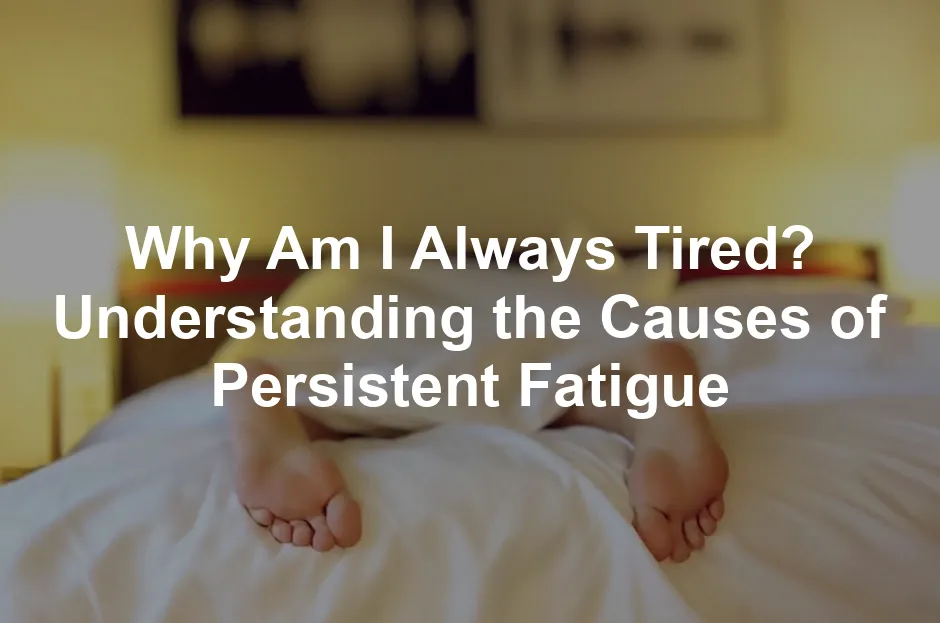
Why Am I Always Tired? Understanding the Causes of Persistent Fatigue
Introduction
Fatigue is the unwelcome guest that crashes your party of productivity and joy. You know the feeling—it’s that annoying sense of exhaustion that sneaks up on you despite a solid night’s sleep. It’s like your bed is a magnet, pulling you back in every morning, even after a full eight hours. You might joke that your spirit animal is a sloth, but the truth is, chronic fatigue affects many, leaving them scratching their heads and asking, “Why am I always tired?”
In our fast-paced, hustle-driven society, it’s all too common to hear friends and colleagues lament about their perpetual tiredness. It’s almost a badge of honor! The irony? People often feel more drained after hitting the hay than when they began. When you wake up feeling as if you’ve run a marathon in your sleep, it’s time to investigate the underlying causes of fatigue.
Understanding why you’re always tired is crucial. Fatigue can signal a range of issues, from everyday lifestyle choices to more serious health conditions. So, if you’re ready to swap your yawns for a little more pep in your step, read on. We’ll uncover the surprising reasons behind your fatigue, how to address it, and ways to reclaim your energy.

Summary
Throughout this article, we’ll tackle the multifaceted nature of fatigue. First, we’ll explore common lifestyle factors that can sap your energy, such as poor sleep habits, diet choices, lack of exercise, and the sneaky thief known as stress. Next, we’ll delve into medical conditions that might be lurking beneath the surface, causing your constant tiredness.
Not only will we provide insights into the various causes of fatigue, but we’ll also provide actionable strategies to combat tiredness. You’ll discover tips on optimizing your sleep, enhancing your diet, and incorporating stress management techniques into your daily routine. Plus, we’ll give you the lowdown on when it’s time to seek medical help for persistent fatigue.
And just when you think you’ve heard it all, prepare for some surprising facts about fatigue that might just make you rethink your daily habits. So, buckle up! Your journey to understanding and overcoming fatigue is about to begin.
Common Causes of Fatigue
Lifestyle Factors
Sleep Deprivation
Ah, sleep deprivation—every adult’s secret nemesis! It’s like trying to run a marathon with a boulder on your back. Most adults need between 7 to 9 hours of quality sleep each night. But let’s face it; life happens! Whether it’s work commitments or binge-watching that new series, sleep often takes a backseat. In fact, research shows that about one in three adults fail to get sufficient sleep. This lack of rest can leave you feeling like a zombie, dragging through the day with heavy eyelids and a foggy brain.
Quality matters too! Interrupted sleep can prevent your body from completing the essential sleep cycles. If you find yourself waking up more than a couple of times a night, it’s time to rethink your sleep hygiene. Make your bedroom a sanctuary—dark, quiet, and cool. Leave the screens outside. Your body will thank you!

Enhancing your sleep experience can be as easy as investing in a Sleep Mask. This little gem blocks out light and creates a cozy cocoon for your eyes, making it easier to drift off into dreamland. Pair it with a white noise machine for the ultimate sleep setup!
Poor Diet
Next up, let’s talk about food. You are what you eat, right? If your diet consists of processed snacks and sugary drinks, it’s no wonder you feel like a deflated balloon! A balanced diet is crucial for maintaining energy levels. Nutrients like iron, vitamin D, and complex carbohydrates are essential for keeping fatigue at bay.
Iron deficiency, especially common among women, can lead to anemia, leaving you feeling exhausted. Incorporate lean meats, leafy greens, and whole grains into your meals to give your body the fuel it needs. Remember, frequent small meals can help maintain steady energy levels instead of the dreaded sugar crashes. So, ditch the junk food and fuel up with healthy options!

To help monitor your dietary choices, consider using a Fitness Tracker. This handy gadget tracks your activity levels and helps you stay accountable to your health goals. Plus, who doesn’t love a little tech to keep you motivated?
Physical Inactivity
You might think, “I’m too tired to exercise!” But here’s the kicker: lack of physical activity can create a vicious cycle of fatigue. It’s a paradox, really! Regular exercise can boost your energy levels and improve sleep quality. Aim for at least 150 minutes of moderate-intensity activity each week.
However, there’s a fine line. Overdoing it can lead to exhaustion, too. Listen to your body—if you’re feeling drained, it might be time for a rest day. Activities like walking, yoga, or even dancing around your living room can invigorate you. So, get moving and shake off that fatigue!

If you’re looking to add a little flexibility to your routine, consider investing in a Yoga Mat. It’s perfect for stretching, practicing mindfulness, or even just rolling out and lounging around. Trust me, every little bit helps!
Stress and Mental Health
Stress—everyone’s favorite unwelcome companion! Stress can sap your energy like a leaky tire. Whether it’s work pressures, family obligations, or personal challenges, prolonged stress can lead to chronic fatigue. Anxiety and depression are equally guilty parties in the fatigue game, draining your mental and emotional reserves.
Finding effective ways to manage stress is key. Mindfulness techniques, such as meditation and deep-breathing exercises, can help. Additionally, don’t underestimate the power of talking it out. Whether with a friend, therapist, or even a pet, sharing your burdens can lighten the load. Prioritize self-care and make time for activities that bring you joy. Your mental health will thank you, and so will your energy levels!

To enhance your mindfulness practice, consider using a Meditation Cushion. It provides the comfort you need to settle into your practice, allowing you to focus on your breath and find your inner zen.
Managing stress is crucial for energy levels. For insights on why understanding emotional responses is crucial for mental health, check out this article.
Medical Conditions
Sleep Disorders
Sleep disorders like insomnia and sleep apnea can wreak havoc on your energy levels. Insomnia makes it difficult to fall or stay asleep, while sleep apnea causes interruptions in breathing during sleep. Both lead to poor sleep quality, leaving you feeling like a walking zombie. If snoring, gasping, or choking sounds disturb your sleep, it might be time to consult a sleep specialist.
Environmental factors can influence sleep disorders like bruxism. Read more about it in this article.
Anemia
Anemia is another culprit behind fatigue, particularly iron-deficiency anemia. Low iron levels mean your body struggles to transport oxygen efficiently, resulting in tiredness and weakness. If you notice symptoms like dizziness or unusual palpitations, a simple blood test can confirm anemia. Treating it often involves dietary changes or supplements.
To boost your iron intake, consider adding Iron Supplements to your diet. They can help replenish your iron levels and boost your energy, allowing you to tackle your day with enthusiasm!

Thyroid Issues
Thyroid problems, both hyperthyroidism and hypothyroidism, can impact your energy levels. An underactive thyroid (hypothyroidism) slows down metabolism, making you feel sluggish. On the other hand, hyperthyroidism can cause excessive energy fluctuations. Blood tests can help diagnose thyroid issues—so don’t hesitate to seek medical advice if you suspect something is off.
Diabetes
Diabetes can lead to fatigue due to its effects on blood sugar levels. When blood sugar is poorly managed, it can result in extreme tiredness, increased thirst, and frequent urination. If you’re often feeling drained despite eating well, it’s worth discussing diabetes screening with your doctor.
Chronic Fatigue Syndrome (CFS)
Chronic Fatigue Syndrome (CFS) is a complex disorder characterized by extreme fatigue lasting more than six months. Unlike regular tiredness, this fatigue doesn’t improve with rest. Symptoms may include muscle pain, sleep difficulties, and cognitive impairment. Diagnosing CFS is challenging, often requiring a thorough evaluation to rule out other medical conditions.
Other Medical Conditions
Several other medical conditions can contribute to persistent fatigue. Heart disease, fibromyalgia, chronic infections, and even certain cancers can leave you feeling drained. Any unexplained, prolonged fatigue should prompt a visit to your healthcare provider. Identifying the underlying cause is critical for effective treatment.
In conclusion, fatigue can stem from a cocktail of lifestyle choices and medical conditions. Understanding the root causes of your tiredness is the first step toward reclaiming your energy. So, assess your habits, seek medical advice if necessary, and let’s tackle that fatigue once and for all!

Strategies to Combat Fatigue
Feeling tired all the time can be frustrating, but the good news is that there are numerous strategies to energize your life! Let’s dive into some lifestyle changes that can help combat fatigue, followed by a guide on when to seek medical help.
Lifestyle Changes
Improving Sleep Hygiene
Sleep is the superhero of energy restoration. To truly harness its power, establish a consistent sleep schedule. Aim for the same bedtime and wake-up time, even on weekends. This consistency helps regulate your internal clock.
Create a restful environment. Keep your bedroom dark, quiet, and cool. Consider blackout curtains and white noise machines if needed. Avoid screens at least an hour before bed; those pesky blue lights can trick your brain into thinking it’s still daytime. Instead, unwind with a good book or some calming music. Trust me, your body will thank you!

Speaking of calming music, a Calming Music CD can create a relaxing atmosphere, perfect for winding down before bedtime. Cue the serenity!
Healthy Eating
What you eat can significantly impact your energy levels. A balanced diet is key. Focus on whole foods, including fruits, vegetables, lean proteins, and whole grains. These foods provide essential nutrients that keep your energy steady throughout the day.
Hydration matters too! Dehydration can leave you feeling lethargic. Aim to drink plenty of water—about eight glasses a day. Also, watch your caffeine and alcohol intake. While that morning coffee might feel like a lifesaver, too much can disrupt your sleep later.

For a healthy boost, consider trying a Protein Powder to supplement your diet. It can help with muscle recovery and keep you feeling fuller longer, which can be a game changer!
Regular Exercise
Exercise is like a magic potion for energy! It may seem counterintuitive, but regular physical activity can actually boost your energy levels. Aim for at least 150 minutes of moderate-intensity exercise each week. This could be brisk walking, cycling, or even dancing in your living room.
Start small if you’re new to exercising. A quick 15-minute walk can work wonders. Gradually increase your activity level, and soon you’ll find that exercise becomes a natural part of your routine. Plus, you might just discover that you feel more energized afterward!

If you want to mix things up, consider using Resistance Bands for strength training at home. They’re versatile, easy to store, and can provide a great workout without the need for heavy weights.
Stress Management Techniques
Stress is a notorious energy thief. To combat it, implement some stress-management techniques into your daily routine. Mindfulness practices, such as meditation or yoga, can help calm your mind. Even a few minutes a day can make a difference!
Deep breathing exercises can also reduce stress levels. Take a moment during your day to focus on your breath. Inhale deeply, hold for a few seconds, then exhale slowly. This simple practice can quickly help you feel more centered.
Don’t forget about the importance of social connections. Make time to chat with friends or family, even if it’s just a quick phone call. Sharing your thoughts and feelings can lighten your emotional load, which in turn can boost your energy.
When to Seek Medical Help
Sometimes, fatigue can be a sign of something more serious. If you find that your tiredness is persistent and impacting your daily life, it might be time to consult a healthcare professional.
Look out for warning signs. If you experience significant weight loss, mood changes, or other unusual symptoms alongside your fatigue, don’t hesitate to reach out to your doctor. Persistent tiredness lasting more than a few weeks without a clear reason should not be taken lightly.
During your visit, your healthcare provider may conduct a physical examination and some tests. They might check for conditions like anemia, diabetes, or thyroid issues. These evaluations can help identify any underlying health problems that could be contributing to your fatigue.
In summary, while combating fatigue often begins with simple lifestyle changes, don’t ignore the signs that suggest a deeper issue. Taking proactive steps can lead to a more energetic and fulfilling life!
Conclusion
In conclusion, chronic fatigue is a complex issue that can stem from a multitude of causes. From lifestyle factors such as poor sleep, unhealthy diets, and lack of exercise to underlying medical conditions and mental health challenges, understanding the root of your tiredness is vital. It’s essential to recognize that feeling tired all the time isn’t normal, and it’s a signal from your body that something might need attention.
Taking proactive steps can make a significant difference. Start by assessing your daily habits—are you getting enough quality sleep? Is your diet balanced? Are you managing stress effectively? Small changes, like adjusting your sleep hygiene or incorporating regular physical activity, can lead to substantial improvements in energy levels.
Don’t hesitate to seek professional help if fatigue persists despite your best efforts. Consulting with a healthcare provider can uncover underlying medical issues, and they may recommend tests or treatments tailored to your needs. Remember, acknowledging your fatigue as a serious concern is the first step toward reclaiming your vitality and enjoying life to the fullest. So, take charge and let’s tackle that tiredness together!

FAQs
What is the difference between tiredness and fatigue?
Tiredness refers to short-lived feelings of exhaustion that typically improve with rest. It’s that feeling you get after a long day at work or a sleepless night. Fatigue, on the other hand, is a more persistent state of exhaustion that doesn’t easily dissipate with sleep or rest. It’s often linked to underlying health issues or lifestyle imbalances and can significantly impact daily functioning.
How much sleep do I need to avoid fatigue?
Most adults require between 7 to 9 hours of sleep each night to function optimally. However, it’s not just about quantity; the quality of your sleep matters too. Aim for uninterrupted sleep, as fragmented rest can leave you feeling tired even after a full night’s sleep. Establish a consistent sleep schedule and create a relaxing bedtime routine to enhance your sleep quality.
Can diet really affect my energy levels?
Absolutely! What you eat plays a crucial role in your energy levels. A diet high in processed foods and sugars can lead to energy crashes, while a balanced diet rich in fruits, vegetables, whole grains, and lean proteins can help maintain steady energy throughout the day. Nutritional deficiencies, particularly in iron, vitamin D, and B vitamins, can also contribute to feelings of fatigue.
What should I do if I feel tired all the time?
If you’re constantly feeling tired, start by evaluating your lifestyle. Ensure you’re getting enough quality sleep, eating a balanced diet, and managing stress. Incorporating regular exercise can also help boost your energy. If these adjustments don’t improve your fatigue, consider consulting a healthcare professional to rule out any underlying medical conditions.
Are there any natural remedies for fatigue?
Yes! Several holistic approaches can help manage fatigue. Regular physical activity, mindfulness practices like yoga or meditation, and staying hydrated are all beneficial. Additionally, certain herbal supplements, such as ginseng or ashwagandha, may help enhance energy levels. However, always consult with a healthcare provider before starting any new supplement regimen.
Understanding Fatigue
What Is Fatigue?
Fatigue is more than just feeling tired after a long day. It’s that relentless sense of exhaustion that seems to stick around, refusing to budge, no matter how much you sleep. Think of it as your body’s way of sending you a playful nudge, saying, “Hey there, something’s not quite right!” While tiredness often fades after a good night’s sleep, fatigue can linger like that one friend who overstays their welcome.
Fatigue can manifest in various ways, including physical exhaustion, mental cloudiness, and emotional depletion. It’s like a triple threat! It can leave you dragging your feet, struggling to focus, and feeling a bit like a deflated balloon. And while it’s easy to brush off fatigue as just another part of adulting, understanding its underlying causes is vital. Ignoring it could lead to more serious health issues down the road.

Types of Fatigue
Fatigue isn’t a one-size-fits-all scenario. It can be classified into different types, each with its unique causes and characteristics:
- Physiological Fatigue: This is the kind that results from lifestyle choices. Think poor sleep habits, excessive stress, or a diet that resembles a junk food buffet. If you’re burning the candle at both ends, your body will eventually wave the white flag.
- Secondary Fatigue: This type is related to specific health issues. Conditions like anemia, thyroid disorders, or chronic infections can zap your energy levels faster than you can say “I need a nap.” If your fatigue seems to come out of nowhere, it might be time to check in with a healthcare professional.
- Chronic Fatigue: Lasting longer than six months, chronic fatigue is the heavyweight champion of exhaustion. It doesn’t just go away after a good night’s sleep. This type can be linked to conditions like Chronic Fatigue Syndrome (CFS), where even the simplest task feels like climbing Mount Everest.
Understanding these types of fatigue is essential to address the issue effectively. By identifying what kind of fatigue you’re dealing with, you can better pinpoint potential solutions and strategies to reclaim your energy. So, let’s roll up our sleeves and get to the bottom of this fatigue mystery!

Please let us know what you think about our content by leaving a comment down below!
Thank you for reading till here 🙂
All images from Pexels




